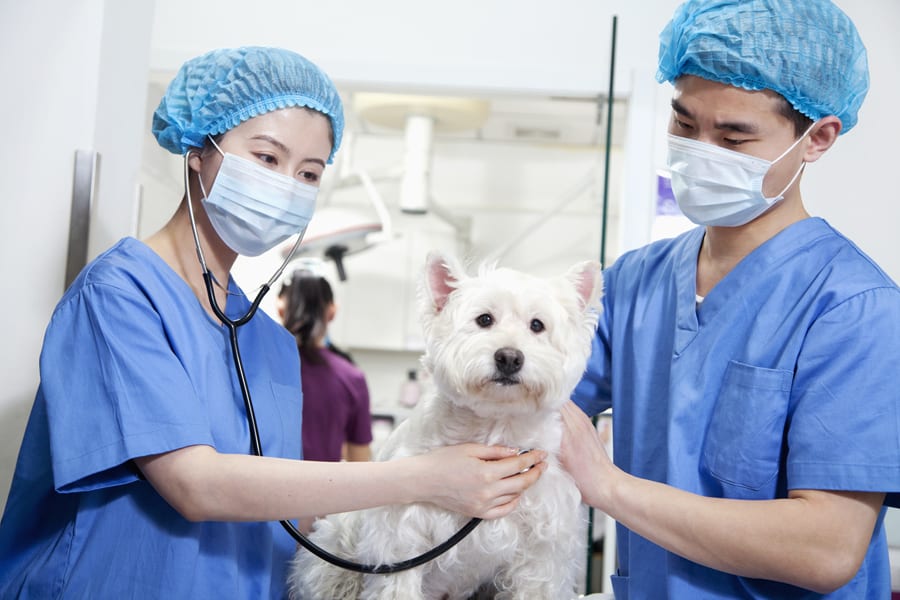Veterinary Tech Career Facts
Updated: 2021 Career data comes from the most recent BLS publication. Education information comes from schools, credentialing and accrediting organizations and is subject to change.
When answering the question, what is a vet tech it is helpful to look at the vet tech job description.
Veterinary Technicians are certified professionals helping with many aspects of animal care.
Vet techs work under the supervision of veterinarians providing support as well as care for the animals using medical knowledge and clinical skills from their training.
Vet technicians may help with a wide variety of tasks such as:
As you can see from the vet tech job description, veterinary technicians enjoy a rewarding career working alongside veterinarians. There are even a number of veterinary tech specialties to consider.
Working along side a licensed veterinarian, vet techs perform a wide range of animal care and nursing duties.
The scope of a vet tech’s authorized tasks is regulated by each state and so your exact duties will vary by location.
Generally speaking, veterinary technicians are authorized to carry out tasks assigned by a licensed veterinarian except for diagnosing a condition, prescribing medicine, or performing surgery on a patient.
One way to think of the duties of a veterinary technician is to compare them to a human nurse but for animals.
Below is a list of some common duties of a vet tech.
Keep in mind the specific scope of duties for a vet tech will be regulated differently in each state.
Vet assistants and vet technicians tend to work together as support professionals for veterinarians. However, the roles they play do vary according to the type of work they are required to perform.
As training for a vet technician requires formal education with professional certification, vet technicians are often used to perform more clinical tasks.
On the other hand, vet assistants do not require any formal training. It is common for vet assistants to work with only a vet assisting certification, while others learn skills when working.
The duties for vet assistants typically include maintenance of the work environment and clerical tasks. Vet assistants also support the veterinarians and vet technicians by keeping equipment available for use, feeding and exercising the animals, and scheduling appointments.
While the majority of states regulate vet technician credentials, there is no credentialing procedure for vet assistants. Most states will specify the procedures to be performed by the assistant and ensure the individuals are authorized to complete these tasks.
For instance, specific criteria related to vet assistants and technicians can be reviewed according to the state-by-state comparison charts.
The charts are maintained by AVMA or the American Veterinary Medical Association.

Vet technologists work closely with vet technicians to complete daily tasks.
The most significant difference between these two roles is the level of further education. Vet technologists need to have a 4-year bachelor’s degree at least, while vet technicians can start work with a 2-year associate’s degree.
In the majority of states, credentialing is similar for both vet technologists and technicians.
Most states do not award specific credentials to vet technologists so in many states this title will be credentialed as a vet technician. Further duties of vet technologists depend on the employer and those that can be legally performed by a vet technician in each state.
While vet technologists and technicians perform similar tasks, vet technologists can use their advanced education to gain supervisory roles or higher positions with more responsibilities.
Using additional training, a vet technologist will be more qualified to work in research-related positions as well.
As new animal science and medical procedures become available so will new changes to the veterinary technician job role.
Working as a vet tech is a highly rewarding career with a lot of opportunity for growth as a Vet Technologist or licensed Veterinarian. If you want to work in a fulfilling medical role that is constantly evolving and offering new learning opportunities then this may be the allied health career for you.
Animal care technology is advancing at a very rapid rate bringing new processes and procedures which leads to growing opportunities for vet technicians, assistants and technologists. The vet tech job description will continue to evolve and expand with new medicines, procedures, technology and training.
